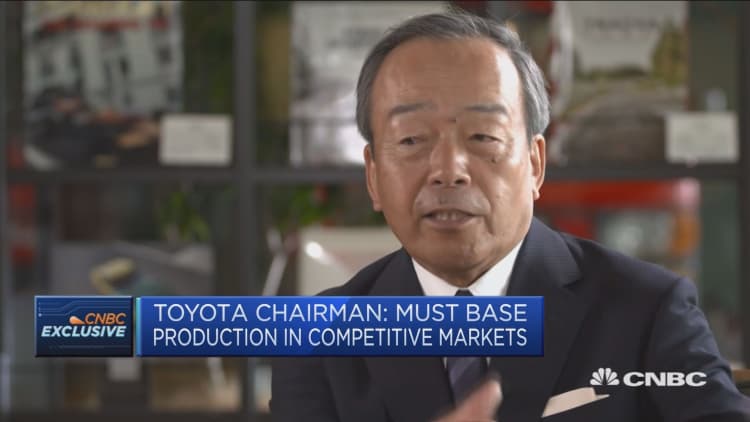
This article is part of a "Reporter's Notebook" series, wherein CNBC journalists submit tales and observations from the field.
The Toyota ties run deep for Takeshi Uchiyamada.
His father was the chief engineer behind the Crown, Toyota's flagship sedan.
He grew up in the castle town of Okazaki, just half an hour south of Toyota City.
Uchiyamada loves this region known for its car prowess so much, he's never been away from Aichi Prefecture for more than three weeks — his entire life.
Yet, the Toyota chairman says it was a Volkswagen vehicle, not a Japanese car, that put him on a path to lead one of the world's top carmakers.
"When I first saw the Beetle, I fell in love," Uchiyamada told me, during a recent visit to Toyota's global headquarters. "I didn't always dream of working for Toyota."
As he approaches 50 years at the company, Uchiyamada's legacy is cemented in Toyota history, as the man who helped reinvent its identity.
Known as the "Father of the Prius," Uchiyamada's journey to the top accelerated in 1994 when then-chairman Eiji Toyoda tapped him to spearhead an internal project to "build a car for the 21st century." The simple marching orders were complicated by the fact that Uchiyamada, better known as an expert in noise and vibration control, had never been a chief engineer before.
A hybrid car was never the first option. But when Uchiyamada's bosses shot down an initial pitch to develop a car with 50 percent better fuel efficiency, he says he knew he had to think outside the box. He and his team of nearly 1,000 turned to a relatively unknown, unproven technology.
"We were aware that if the technology was to be widely accepted, convenience for the user, the customer experience would have to be a key consideration," he said. "As we continued our work on the hybrid … we realized that electrification is inevitable, and the vehicle needed to be equipped with a system to supply electric power to the motor."
While Toyota may have started the industry on the road toward electrification — selling more than 10 million Prius hybrids globally on the way so far — the company finds itself trailing in the race for the next generation "21st century car" today, as it looks to the future. Japanese rival Nissan, Tesla, and General Motors have all beat Toyota in bringing a fully electric vehicle to market, while tech companies like Alphabet and Baidu have picked up the innovation mantle, leading the drive for fully autonomous cars.
Uchiyamada, who once said he didn't believe the market would accept an all-electric vehicle, rejects the notion that Toyota has been in denial about the advancement of EVs. Yet, he says the industry is still "two or three technological breakthroughs away" from realizing an EV that is truly consumer-friendly, largely because of limited battery capabilities.
"Carmakers will have no choice but to roll out electric vehicles or risk going out of business. Toyota is no exception," he said. "But we are skeptical there will be a rapid shift to pure electric vehicles, given questions over user convenience."
With the 20-year anniversary of the Prius quickly approaching, Uchiyamada has his eyes firmly on the next breakthrough for Toyota. He has prioritized investments in artificial intelligence, and autonomous driving, in part to reduce the number of accidents on the road. The company has also set out an ambitious target of reducing the company's emissions 90 percent by 2050.

Uchiyamada talks about an "exciting future" where cars are connected to the cloud, and act as sensors that work within a larger social system.
And yet, you also get the sense that he's torn by the rapid shifts in the industry — excited about where the technological advancements will lead the car maker, yet quietly questioning whether those changes will inherently transform the very driving experience he fell in love with in the first place.
As we walk towards the Toyota Automobile Museum, Uchiyamada tells me he is so fond of his personal Prius, he's taken to nicknaming it "Priyu-chan." He says Toyota is pushing ahead with research and development that will enhance autonomous driving features in its cars — but he doesn't want those features to limit human driving altogether, because it will take "the fun out of cars."
Uchiyamada guides me to the first generation Prius on display at the museum, placed in the corner among all the other vehicles Toyota has developed over its more than eight-decade history.
As he goes on to explain the thinking behind every feature in the car, it's clear his pride in his first product hasn't diminished, even after 20 years.
"I may have earned the name the 'Father of the Prius," he says. "But now that 20 years have come and gone, 'Grandfather of the Prius' sounds more appropriate."


